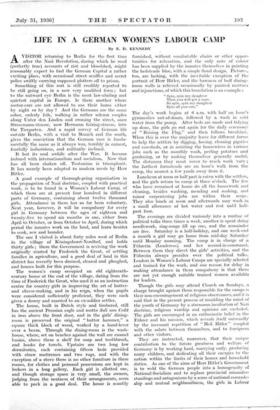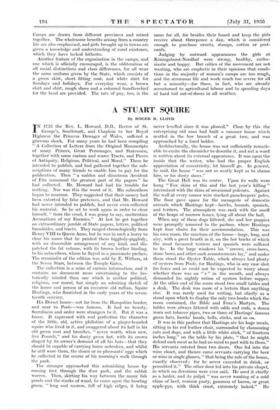LIFE IN A GERMAN WOMEN'S LABOUR CAMP By S. D.
KENNEDY AVISITOR returning to Berlin for the first time after the Nail Revolution, during which he read (perfectly true) accounts of riot and bloodshed, might reasonably expect to find the German Capital a rather exciting place, with occasional street scuffles and secret police swiftly carrying supposed plotters off to prison.
Something of this sort is still credibly reported to be still going on, in a now very modified form ; but to the outward eye Berlin is the most law-abiding and quietest capital in Europe. Is there another where motor-cars are not allowed to use their horns either by night or by day ? And the Germans are the same sober, orderly folk, walking in rather solemn couples along *linter den Linden and crossing the street, once Stresemann-strasse, now Hermann Goring-strasse, into the Tiergarten. And a rapid survey of German life outside Berlin, with a visit to Munich and the south, gives the conviction that the German race is funda- mentally. the same as it always was, terribly in earnest, fearfully industrious, and militarily inclined.
It lost its soul awhile after the War. It became imbued with internationalism and socialism. Now that has all been shaken off. Teutonism is triumphant. It has merely been adapted to modern needs by Herr Hitler.
A good example of thorough-going organisation in the propagation of Nazi doctrine, coupled with practical work, is to be found in a Women's Labour Camp; of which there are at present four hundred in different parts of Germany, containing about twelve thousand girls. Attendance in them has' so far been voluntary. Next year, however, it will be compulsory for every girl in Germany between the ages of eighteen and twenty-five to spend six months in one, either from April to October, or from October to April, during which period the inmates work on the land, and learn besides to cook, sew and launder.
The one I visited is about forty miles west of Berlin in the village of Koningshorst-Nordhof, and holds thirty girls ; there the Government is reviving the work originally started by Frederick the Great, of settling families in agriculture, and a good deal of land in this district has recently been drained, cleared and ploughed, and houses built for this purpose.
The women's camp occupied an old eighteenth- century house at the end of the village, dating from the time of Frederick the Great, who used it as an instruction centre for country girls in improving the art of butter- and cheese-making, and in his reign, when the pupils were .considered sufficiently proficient, they were each given a dowry, and married to an ex-soldier settler.
The house, built in Dutch style and timbered, still has the__ ancient Prussian eagle and motto Soli non Cedit in iron above the front door, and in the girls' dining- room is preserved the original " butter hammer," a square thick block of wood, worked by a hand-lever over a beam. Through the dining-room is the wash- house, where, set on benches against the wall are enamel basins, above them a shelf for soap and toothbrush, and hooks for towels. Upstairs are two long low dormitories, each containing fifteen beds provided with straw, mattresses and two rugs, and with the exception-of a stove there is no other furniture in these rooms, for clOthes and personal possessions. are kept in lockers An a long gallery: Each girl is allotted one, and though storage space is. very, small, the owners, judging „from the neatness,. of, their arrangements, seem able to pack in a good deal. The house is scantily furnished, without comfortable chairs or other oppor- tunities for relaxation, and the only note of colour has been supplied by the inmates themselves in painting the bedsteads blue, with a simple floral design. Pictures, too, are lacking, with the inevitable exception of the portrait of Herr Hitler, and the bareness of buff dining- room walls is relieved occasionally by painted mottoes and injunctions, of which this translation is an example ;
" Spin, spin my daughter Then you will got a man. So spin, spin my daughter Spin all you can."
The day's work begins at 6 a.m. with half an hour's gymnastics out-of-doors, followed by a wash in cold water from the pump. After beds arc made and tidying up done, the girls go out again for the daily ceremony of " Raising the Flag," and then follows breakfast. When this is over the majority leave for different farms to help the settlers by digging, hoeing, cleaning pigsties and cowsheds, or in assisting the housewives in various jobs such as the monthly wash, peeling potatoes and gardening, or by making themselves generally useful. The distances they must cover to reach work vary ; the farthest farmsteads are an hour's walk from the camp, the nearest a few yards away from it.
Luncheon at noon or half past is eaten with the settlers, and the girls return to camp at three o'clock. The few who have remained at home do all the housework and cleaning, besides washing, mending and making, and minor carpentering jobs are within their scope. They. also lunch at noon and afterwards may wash in a small allowance of hot water and rest until half- past four.
The evenings are divided variously into a routine of political talks three times a week, another is spent doing needlework, sing-songs fill up one, and the remainder are free. Saturday is a half-holiday, and one week-end a month a girl may go home from mid-day Saturday until Monday morning. The camp is in charge of a Fiihrerin (Leaderess), and her second-in-command. Between them they direct the girls' activities, and the Fuhrerin always presides over the political talks. Leaders in Women's Labour Camps are specially selected and trained for the work, and one reason for delay in making attendance in them compulsory is that there are not yet enough suitable trained women available for leaders.
Though the girls may attend Church on Sundays, a charge brought against those responsible for the camps is their non-encouragement of religious observances, and it is said that in the present process of moulding the mind of the youth of Germany by a strenuous inculcation of Nazi doctrine, religious worship and opinions are excluded. The girls are encouraged in an enthusiastic belief in the Fiihrer and his mission, which reveals itself outwardly by the incessant repetition of " Heil Hitler." coupled with the salute between themselves, and to foreigners and other visitors.
They are instructed, moreover, that their unique contribution to the future greatness and welfare of Germany is by working hard, marrying early, producing many children, and dedicating all their energies to the nation within the limits. of their homes and household duties. As one of the aims of Herr Hitler's Government is to weld the German people into a homogeneity of National-Socialism and to replace provincial misunder- standings and antagonisms by a sense of national comrade- ship and mutual neighbourliness, the girls in Labour Camps are drawn from different provinces and mixed together. The wholesonie benefits arising from a country life arc also emphasised, and girls brought up in towns are given a knowledge and understanding of rural existence, which they have lacked hitherto.
Another feature of the organisation in the camps, and one which is officially encouraged, is the obliteration of all social distinctions and class differences, for all wear the same uniform given by the State, which consists of a green skirt, short fitting coat, and white shirt for Sundays and holidays. For everyday wear, a brown skirt and shirt, rough shoes and a coloured handkerchief for the head are provided. The rate of pay, too, is the same for all, for besides their board and keep the girls receive abOut threepence a day, which is considered enough to purchase sweets, Stamps, cotton or post- cards.
Judging by outward appearances the girls at Koningshorst-Nordhof were strong, healthy, enthu- siastic and happy. But critics of the movement are not wanting, who are emphatic in their opinions that condi- tions in the majority of women's camps are too rough, and the strenuous life and work much too severe for all but a minority—for those, in fact, who are already accustomed to agricultural labour and to spending days of hard toil out-of-doors in all weather.







































 Previous page
Previous page